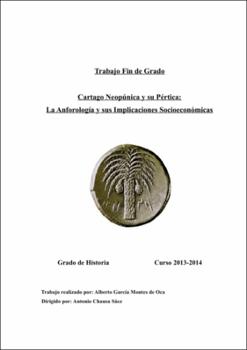Cartago Neopúnica y su Pértica: La Anforología y sus Implicaciones Socioeconómicas
Fecha
2015Resumen
La historia de Cartago es muy amplia. Desde su fundación en el siglo IX a.C.
hasta su desaparición casi total tras la tercera Guerra Púnica en el 146 a.C., y desde la
refundación en época imperial romana hasta su transformación hacia su variante
medieval, Cartago sustentó la base de su economía en la agricultura, motor básico para
realizar las transacciones comerciales que le dieron su categoría de gran civilización en
el Mediterráneo. Desde antes de su fundación, los fenicios conocían el potencial de la
tierra y su posición estratégica y en época imperial romana, la Cartago neopúnica se
habría convertido en uno de los centros principales de exportación hacia el Imperio
Romano, siendo conocido el Norte de África como el granero de Roma. En cuestión de
documentos históricos, la Arqueología es uno de los principales medios de indagación e
interpretación de los modos de vida en la ciudad y su desarrollo agrícola, fundamentado
en especial en el olivo y la vid. La Arqueología permite materializar la Historia y ofrece
diversas interpretaciones sobre aspectos sociales, económicos, religiosos o productivos.
Son características no siempre reflejadas en la documentación escrita. The History of Carthage is very wide. Since the foundation at 9th century b.C. to
its nearly disseapering after 3rd Punic War at 146 b.C., and since the re-foundation in the
Roman Empire age to its medieval conversion, Carthage supported the economic
ground on agriculture, main source for their trade and changes that beared the title of
Great Civilization of the Mediterranean. Before the foundation, Phoenician people knew
about the land possibilities and strategical position and at Roman Empire age, Neopunic Carthage had become one of the main exporting cores of the Roman Empire, the
North of Africa was known as the roman granary. Regarding non documents, the
Archaeology is one of main forms to obtain a better understanding and interpretation of
the city´s lifestyle and agricultural basis, mostly supported on vine and olive tree. The
Archaeology allows History making and many interpretations about social, economical,
religious or productive themes. These, are knowedges and themes not ever reflected on
written documents.




